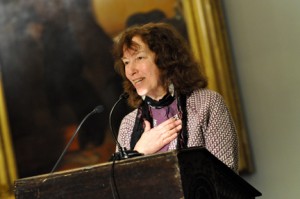Though many strides have been made in providing educational opportunities for adults, adult illiteracy still remains a major issue in this country, according to three prominent local educational figures.

On March 11, the Boston Athenæum hosted a panel discussion featuring Wick Sloane, Joanne Appleton Arnaud, and Linda Nathan, entitled, “Adult Literacy in the Digital Age,” the second program in the 2010 Civic Discourse series, Literacy and Democracy, presented by the College of Arts & Sciences at Suffolk University and the Boston Athenæum.
The discussion was moderated by James Tracy, headmaster of Cushing Academy and former visiting fellow in the Department of History at Yale University.
Each panelist offered a 10-minute presentation that discussed contemporary literacy issues and possible solutions, as well as personal experiences in aiding these problems. The presentations were followed by a question and answer session with the audience.

Sloane, a professor of expository writing at Bunker Hill Community College and author of the pamphlet Common Sense, which discusses the obsolete nature of the four-year bachelors degree, shared with the audience many examples of literary achievements from his students, including a letter written to Sen. Kerry, showing the possibilities that can be produced when students are given opportunities in a classroom setting.
“Kids need time and opportunity,” Sloane said, while offering ideas to help fix the problems of illiteracy, such as allocating tax benefits to colleges to fund programming.
“I have a vision that people would make sure that a child is read to for 15 minutes each day. Then the child would eventually be unstoppable,” Sloane said.
Arnaud, co-founder of the Women’s Studies Department at the University of Minnesota and current executive director of First Literacy, a Boston-based organization that helps provide adults with educational opportunities, stated that many adults are currently seeking help in

becoming literate. However, the scarcity of programs has left many people out in the cold. Arnaud stated that last year 6,972 adults were on waiting lists for local literacy programs and some people wait as long as three years before receiving help.
According to Arnaud, 43 million American adults read at a basic level and an estimated 45 percent of the adult population is in need of literacy skills. Arnaud lauded the effects of distance learning programs, such as online courses, which she feels can help with an issue that not much attention is given to.
“It’s very rare that people talk about adult literacy. It’s one of the few social problems that can be cured. (The issue) just needs money,” said Arnaud.

Unlike Sloane and Arnaud, Linda Nathan, founding headmaster of the Boston Arts Academy and author of The Hardest Questions Aren’t on the Test: Lessons from an Innovative Urban School, mainly discussed the literacy struggles amongst the younger population of America.
Nathan expressed her beliefs that many of today’s literacy problems are caused by the design of today’s education system and its emphasis on teaching purely to improve standardized test performances, rather than encouraging students to read for pleasure. At the Arts Academy, Nathan established mandatory blocks of time to focus on literacy skills and created a program called “Lunchtime Lit,” which allows students and teachers to share the spoken word as a means to improve literacy.

“For students to be critical readers, I think a goal needs to be set to read 20 books a year. Our students need to see where books can lead them,” Nathan said.
In his closing remarks, Tracy echoed the sentiments of the three panelists, adding that the current digital era has worked to create learning opportunities that may improve literacy.
“As an educator, I am very optimistic,” Tracy said. “We are living in an era where accessibility is not a challenge anymore.”
Additional Information
The next event in the Literacy and Democracy series, Teaching Literacy in Senegal, will be held on Monday, March 22 at 6 p.m. at the C. Walsh Theatre with Viola Vaughn, founder and executive director of the Women’s Health Education and Prevention Strategies Alliance as the featured speaker. All events in the series are free and open to the public through reservations. Please call 617-720-7600 to reserve seats.









